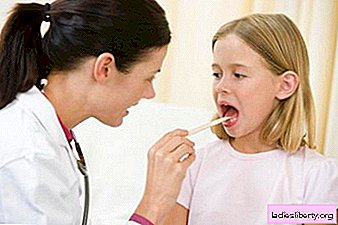
Adenovirus infection is an acute febrile illness accompanied by damage to the respiratory system and eyes, lymph nodes and intestines. It is caused by special pathogens - adenoviruses, and belongs to the group of acute respiratory viral infections (ARVI), accounting for approximately one fifth of them. Most often, infants and young children suffer from this disease.
Adenovirus infection in children - causes
As a rule, a child becomes infected by an airborne infection, but the transmission route can be food, water and contact household. Infection carriers can be patients with both explicit and latent forms of the disease in the first 2 weeks of the disease. Adenoviruses enter the environment mainly during coughing and sneezing, however, they may also contain discharge from the eyes.
Given that adenoviruses can perfectly exist and multiply in the epithelial cells of the intestinal mucosa, it is also easy to get infected through dirty hands, the use of common care items, common toys, etc.
Adenovirus infection in children - symptoms
The onset of the disease is usually acute, with an increase in body temperature to 39 ° C, headache, muscle pain, impaired appetite, general weakness. The duration of the febrile period, as a rule, is from 6 to 14 days. The onset of adenovirus infection is also manifested by nasal congestion, runny nose, sore throat when swallowing.
The disease is characterized by simultaneous inflammation of the mucous membranes of the nose and pharynx, and inflammation can also affect the nose, pharynx and tonsils. Children often develop laryngitis, tracheitis, bronchitis, pneumonia can develop.
Complications of adenoviral disease include inflammation of the sinuses, which may be accompanied by conjunctivitis.
Adenovirus infection in children - treatment
Treatment is carried out at home and is determined by clinical manifestations and the presence of complications. Severe forms of the disease, the appearance of complications and the presence of concomitant diseases that aggravate the course of this disease are the basis for hospitalization.
During the period of fever, the child must observe bed rest. He needs to provide a complete and balanced diet, it is advisable to include in the diet more dairy foods and foods high in carbohydrates.
Antibacterial therapy is used only in severe cases of the disease and complications of a bacterial nature; in other cases, the use of antibiotics is not indicated.
If the disease is accompanied by high fever, it is necessary to use antipyretic drugs. A severe dry cough requires the use of mucolytic (expectorant) drugs, a wet cough can be treated with massage, exercise therapy. Treatment of the common cold is performed with vasoconstrictive drops.
In addition, the child must take drugs that restore the quantitative and qualitative composition of beneficial microflora and affect harmful bacteria. Treatment of adenoviral infection in children is carried out with the active use of antiviral drugs.











